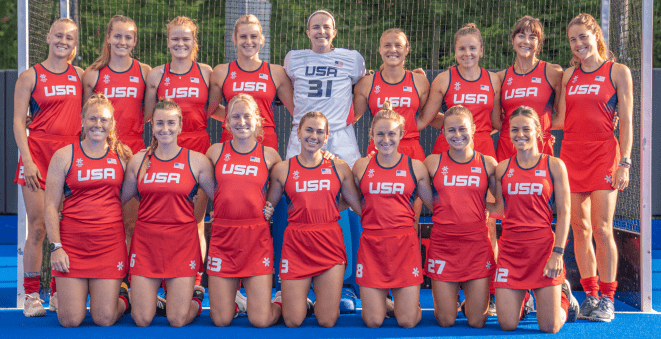The first time Linda Kreiser arrived in South Africa it was 1974 and the country was still ruled by apartheid.
“For me, it was really, eye-opening, to see, ya know, the segregation,” Kreiser told Female Athlete News. “And, in fact, personally, because I’m half Japanese, I had to have a special permit to stay with my team, and things like that, because I was a non-white. So, I got to experience a little bit of it, but not very much. I was very sheltered being part of the team. But, I really could appreciate how I felt to notice the segregation. Obviously, there had been segregation in the United States, but I never got to see it that closely.”
Kreiser, who announced her retirement earlier this year, played in the 2022 World Masters Hockey World Cup in October in Cape Town, South Africa. Kreiser was head coach at Lower Dauphin in Hummelstown, Pennsylvania for 45 years. She retired in March as the second most winningest high school field hockey coach in the nation.
“It’s kind of a bookend tour of my career because I was just 25 at that time,” she said. “And, now I’m on the over-65 team. A lot has passed in between.”
Kreiser has won seven Pennsylvania Class 3A state championships, 16 District 3 Class 3A championships, and ends her coaching career with an 876-124-44 record. She’s influenced the lives of thousands of people.
Her lifelong love for playing hockey began at Lower Dauphin; when she matriculated at Millersville; and then it was galvanized on her first trip to the African continent.
“When I was there back in 1974, I was a member of the US Team, and we had a six-week tour around South Africa, which was fantastic,” Kreiser said. “We started in Johannesburg and then worked our way to Lesotho, and then to Cape Town, and we had international games with their national team.”
The US team played at three different sites: Johannesburg, Cape Town, and Durbin. The English hosted the games and the Afrikaans were in power and ran the government, which set the apartheid standards.
“The hockey was fantastic back then,” Kreiser said. “The hosts were so nice. At that time, we didn’t stay together as a team. Two of us each got to go to peoples homes and we were hosted. We got to have some wonderful experiences. We got to go on safaris back then. I was able to ride an ostrich at an ostrich farm. We saw all different parts of South Africa. We were on top of Table Mountain, and things like that. All these memories were in my mind when I made this current Masters Team, thinking like wow, I get to go back and see that again. I was really grateful to have another opportunity to go back and to be able to see all the changes and the integration and the acceptance. They have 11 different languages, and people were all mixing together and supporting one another as South Africa.”
Kreiser said she wasn’t able to make it to Robben Island, where anti-apartheid and human rights activist Nelson Mandela was imprisoned.
“Many of my teammates went there,” she said. “And they said it was amazing. He endured and was able to write all the things that he did to make his country united.”
The over-65 team claimed bronze, played five games, and soaked up the culture, Kreiser said. On her days off, she and her teammates visited the Aquila Private Game Reserve, which was a two-hour drive. They took a three-hour Jeep ride, where Kreiser said she saw zebras, rhinos, hippos, and giraffes in their natural habitat.

“We didn’t see the lions,” she said. “The day we were there, the lions were out hunting, so we didn’t get to see them. My teammates saw them, so I do have some lion pictures.”
The Americans had a seven-hour flight to Amsterdam, and then an 11-hour flight to Cape Town.
“We had a practice the first day at one of the venues we were going to play in,” she said. “And, behind us, was Table Mountain. The weather was 65 degrees, blue skies, and very little clouds, and the scenery was just breathtaking. It was a great start to our two-week stay. Our hotel was in the outskirts of Cape Town. It was the best breakfast buffet that I’ve ever had. They provided ice baths, meeting rooms. We felt like we were rock stars over there.”
Team USA arrived on a Wednesday, and their first game was on a Saturday, she said.
“We had a wonderful sendoff,” Kreiser said. “The Monday before we left, the teams dressed in all red, white, and blue. The junior and senior high got together for a pasta party. They had a huge sign that read, ‘Go USA.’ It was really special. Games were livestreamed. And, they said, ‘we’re going to watch you play.’ I’m beyond getting nervous to play. But, when I heard this entire team was going to watch me go play, I was very nervous. They did watch me play. We were fortunate enough to win the game they watched. I happened to be chosen to take a penalty stroke, and I made the stroke.”
Kreiser’s Falcons cheered for their coach much like she has done for them. A picture of them cheering was texted to Kreiser’s head coach in Africa, who then shared it with the Masters team.
“It was very special,” Kreiser said.
The over-65 team lost to England, which were the defending 2018 Masters Hockey World Cup champions.
“We knew they would be a tough team,” she said. “We lost 2-nothing.”
They next played against the Alliance team, which is made up of athletes who can’t field a full team from their respective country, so they merge players from various countries onto one team, she said. Kreiser’s team won 3-0.
They then played the Spirit of Masters, which was another team from England. They tied 0-0.
“We were in second place, England was first, and Scotland was third,” Kreiser said. “We had to play Scotland in the semifinals. We were real excited. We thought, ‘oh, we beat them once, we can beat them again.’ And, we played really well, but they had a really nice breakaway and they happened to score. During the fourth quarter, we were down in their end; we had corners, and shots, but we just couldn’t find the cage. So, we came in third.”
The growth of USA Masters field hockey is just getting started, Kreiser said. Her experience brings her great satisfaction.
“Any time you get to compete, you still remember how you used to be and it’s only when you watch yourself on the video stream that you realize that you’re much slower, and things like that,” she said laughing. “It was nice, because all are over 65, so we could at least compete with everybody.”
Her Falcons also benefitted from the competition, Kreiser said. She watched other teams during warmups and shared a South African play with her athletes.
“They called it the crash drill,” she said. “They just hit the ball as hard as they can at the cage and then someone tips it in. Of course, I had to show my girls.”

The World Masters Hockey World Cup is every two years. It wasn’t played in 2020. Kreiser, who has played in three Masters World Cup tournaments, is a USA Masters committee member.
“Masters starts at 35,” she said. “Other countries, especially in Europe, Masters is a progression. Even if you don’t play on your national team, they keep playing and they can be on a club squad. I think other countries value the Masters more because it’s so new in the US. We only started masters in 2014. This is our fourth world cup. Our database is growing. People are starting to join. I would encourage players to keep active and stay fit.”
USA Masters had four teams from the United States, over-50, over-55, over-60, and over-65. Traveling is self-funded.
“It was a fabulous trip for me,” Kreiser said. “It was fun and so memorable. The South African committee really went all out. We had all the perks. Beautiful opening ceremony walking through the waterfront and then the closing ceremony in Cape Town. It was fun meeting the players on the other teams. They love the sport as much as you do. You’re not on the island by yourself, so that was nice.”




